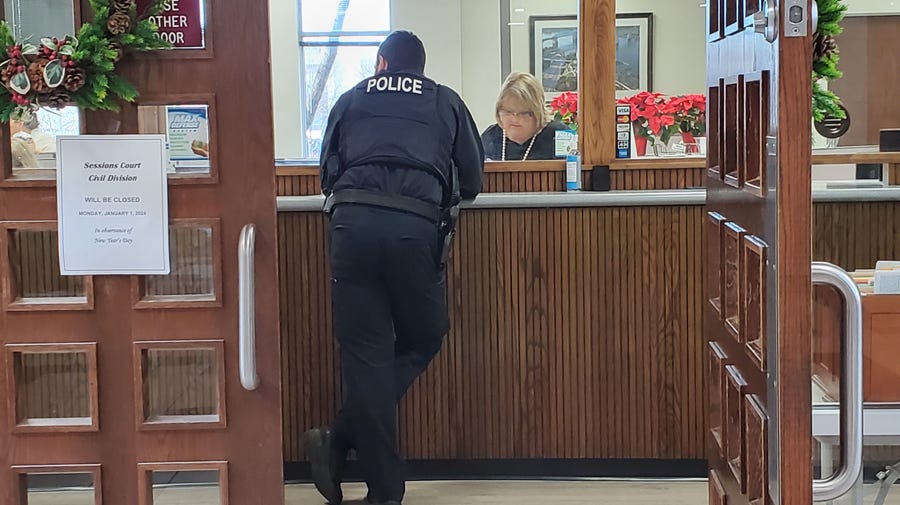Arrest warrant atheism? Judge says defendant must bring up issue
Patterson tells reporter that demand for reform under magistrate Lorrie Miller must await issue to come up in legal proceedings

CHATTANOOGA, Tenn., Wednesday, Jan. 24, 2024 — Judge Boyd Patterson says he and fellow criminal court judge Barry Steelman have reviewed my inquiry regarding my claim that arrest warrants are improperly handled — and put their toes on a line across which judicial authority does not cross.
By David Tulis / NoogaRadio Network
Addressing this reporter in open court today Judge Patterson makes oblique reference to my complaint filed with chief magistrate Lorrie Miller about how arrest warrants are created so badly that they fundamentally breach defendants’ right and frustrate the right of the people to swear out criminal complaints without “copsplaining” coming into the process.
Judge Patterson says the matter is being considered, but that the court cannot offer any sort of “advisory opinion” on the practice of forbidding victims, fact witnesses and people with firsthand knowledge of a crime from swearing out arrest warrants before a magistrate or other judge.
I informed Magistrate Miller on Dec. 26, 2023, her policy is illegal and violates the code of criminal procedure. I asked Judge Patterson to review the grievance as he was handling the Shameca Burt prosecution involving a false report that put her behind bars 108 days. He says resolution may have to wait until criminal case brings up the issue.
The judge’s wariness of declaring what the law states outside the context of a case recognizes that judicial authority is passive.
Judicial authority is properly invoked or aroused by a court case. A court’s authority does not operate apart from pleadings regarding facts in a given dispute. One way to get a judicial advisory opinion is by a petition for a declaratory judgment in an actual or pending controversy, T.C.A. § 29-14-101 et seq, also at T.C.A. § 4-5-225. People also can file before a state agency a petition for a declaratory order to determine the “validity or applicability of a statute, rule or order” in an agency’s jurisdiction.
Such action is by court filings, not by journalistic inquiry, Judge Patterson suggests. The question to ask is, “Will a member of the defense bar raise this matter when it has gone on since at least the hiring of Mrs. Miller in 2018 by the county commission?” Attorneys and lawyers in Chattanooga are on the whole an unimpressive lot who have let operate many evils, ones which can be properly identified in defense of their clients.
Under Mrs. Miller, a police officer or sheriff’s deputy listens to a citizen’s complaint about a crime committed. This officer turns around and presents credible reports to any of four magistrates. The law requires the complainant to reduce the facts to writing, and to be sworn. An officer without first-hand knowledge is not qualified or is not a proper party, no matter how he swears or drafts the warrant.

Mrs. Miller guarantees that every arrest warrant is based on hearsay, that no arrest warrant will be issued based on first-hand knowledge or a victim statement.
It is an extraordinary breach of law against a defendant who is arrested under the warrant without the fact witness swearing before a magistrate, under penalty of perjury, or through an oath before God that the accusation is true. without the sanction of God’s judgment or the penalty of the perjury statute, a person can make a complaint and not be held liable for it being false, except perhaps through the false statements law.
Mrs. Miller’s rule makes the warrant scheme atheistic, striking God’s power from supervising the process.



